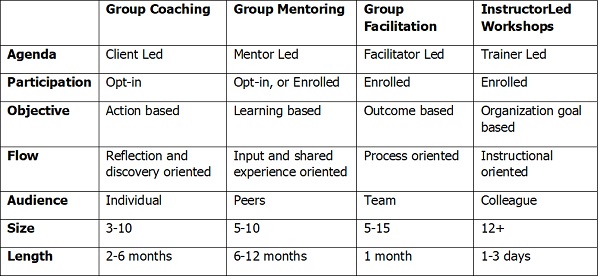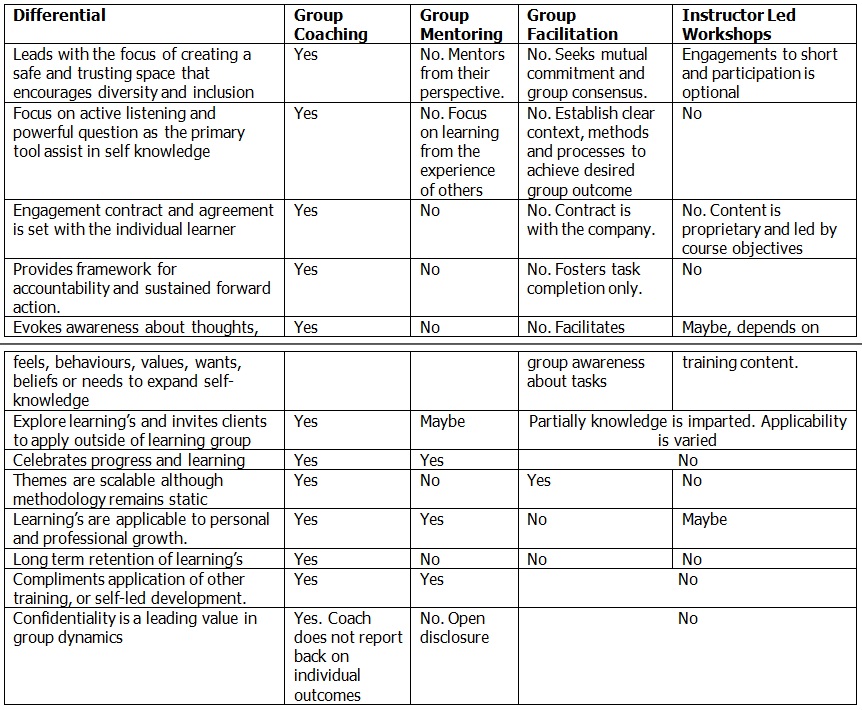 Research Paper By Pascale Gonthier
Research Paper By Pascale Gonthier
(Career Coach, CANADA)
Individually, we are one drop. Together, we are an ocean. Ryunosuke Satoro
 Abstract
Abstract
Group coaching is emerging as a solution to the growing need to engage and develop the virtual workforce in a meaningful way that fosters inclusivity and results in individuals modeling behaviors that lead to positive performance.
Introduction
In 2020, the corporate world was faced with a global pandemic with the Corona Virus. This global crisis required businesses to react quickly and to fast-forward their technological infrastructure to support a virtual and digital workplace (KPMG Business Implications of COVID-19, 2020). It also forced a shift in the corporate mindset about how to keep their workforce productive and engaged, and how best to equip their leaders with the tools and skills needed to lead effectively in a remote setting. This research paper explores the business case for corporations to invest in group Coaching (GC)modality to support and advance them in a virtual work environment.
What makes group coaching relevant?
It is my position that professional coaching should be made accessible and affordable to a larger audience, expanding beyond just the top-level executives and leaders. Rather, coaching should be weaved throughout the fabric of the workforce to help create a corporate culture of personal growth resulting in professional performance. Personally, I have benefited significantly from being a client in a couple of different coaching engagements and it saddens me to think that this benefit is reserved for the few rather than an opportunity available to the many. It is with this intention that I propose a business case for the integration of Group Coaching into the workplace.
What is group coaching?
Group coaching is still largely in the beginning stages of adoption, in 2008 there was an emerging shift by an organization looking for group coaching programs. This shift was triggered, in part, by the economic events in 2008-2009 reducing investment in Learning and Development (Britton, 2010). Another influential factor was the rise in popularity of the benefits of Systemic learning which proposed that “group performance improves due to the broader awareness, alignment, and accountability achieved through the process of dialogue with others”(Brown, S. and Grant, A., 2010).
Since then, the options that have emerged in the field of group learning include group coaching, group mentoring, group facilitation, and group workshops. The continuum to deliver on the group setting ranges from corporate trainers, licensed facilitators, HR professionals, Certified Professional Coaches, or a blended model. Given the spectrum of the service offering in this space, it’s not surprising that there is some confusion on the difference between Group Coaching a separate modality. To simplify, the comparison, I have created a reference table to assist in the understanding. The table outlines the primary differentiators to another group process.
Table 1: High-Level Comparison of Group Modalities

Why coach in groups?
The research clearly shows that coaching has great potential to enhance the performance, productivity and well-being of individuals, organizations, and the people that work for them. (e.g., Grant, 2003).
The benefits of group coaching, like most modalities in the field of learning and development, are hard to quantify. As such establishing a metric, a scale or a scoring system on the effectiveness and advantages of group coaching remains primarily anecdotal via testimonies. However, for this paper, the list below is a compilation of generalized benefits extracted from the cited reference literature, including an interview with author Jennifer J. Britton (Britton, Interview with Jennifer Britton, 2020).
Financially, the benefit of the learning investment is spread out while also remaining highly focused on the individual thereby increasing retention and applicability of the skill development.
From a workforce perspective, the element of being in-community creates a sense of belonging that can foster greater engagement, creativity, and assists in building on corporate values and desired behaviors. Leading changes within an organization on culture and behavior in a group setting can affect broader impact because there is a natural tendency for individuals to resist change but when leading change in coalition (Kotter’s 2007 – reference website).
What are the differential benefits of Group Coaching?
A new survey found a third of employees who quit their jobs did so because they didn’t learn new skills or better performance. A lack of career growth is one of the biggest reason workers leave, second only to low pay. Business Insider, 2020
With Coaching, there is a collaborative and egalitarian rather than an authoritarian relationship between coach and coachee. Group coaching is more about asking the right questions than telling people what to do (facilitation), nor is necessarily concerned with the transmission of subject-matter expertise (training), or advice-giving (mentoring). Consequently, coaching is an inherently a participative activity in which energy, knowledge, and information are shared and co-created within the relationship. (Psych Journal, 2019,)
Some of the intangible yet key differential benefits of group coaching over other group modalities are listed below in Table 2. For this comparison, the following assumptions were made:
Table 2: Differential Benefits of Group Coaching

Overall, group coaching is unique. The differential benefits list above offers the environment for an in-community learning and support group experience that invites a variety of perspectives and diversity into the process. It can also greatly influence the workforce’s level of happiness in their jobs. A Whitepaper published by ICF in April 2020 states that the use of coaching skills is related to empowerment and engagement (DiGirolamo & Tkach, 2020). Engagement is an important point because employers want to keep attrition low while also fostering a culture of continued growth to remain relevant to optimize productivity.
Where is the market potential for Group Coaching in Canada?
Even before the pandemic, organizations in every sector were struggling to attract, recruit and retain people with the skills needed to help them succeed. (Deloitte, 2020)
The market is ready for Group Coaching, in fact, the timing is right now. With COVID, the changes in when, where, and how we do business provides an opportunity for Learning and Development leaders to look at how they engage and develop most of their workforce at the lowest cost with the highest return. Regardless of geography, mobility, age, culture, seniority, or experience, Group Coaching is about the individual within a group, and not the other way around which is the typical instructor-led format.
Before CoVid, The Conference Board of Canada reported that the average annual spend per employee is only $889, but that the average hours of learning per employee is also on the rise by 28% in the past 5 years (The Conference Board of Canada, 2018). While training is on the rise, it is the employee who is initiating their own learning, as instructor-led training has decreased by 48% in that same timeframe. The opportunity here for Group Coaching is huge. It’s the only modality that is scalable enough to maximize the collective spending of a workforce, it provides a support structure to enhance those that are driven and doing self-led training; and, group coaching supports the retention rate of learning investments made via the instructor-led classroom format.
The pandemic also accelerated shifts in remote workforce demographic, and as we look further into the future with the rise of Generation Z who already trend towards a flexible work-life (PWC, 2020), as such the niche to gather in-community amongst peers and colleagues will be an opportunity for Group Coaching (GC). Growth in the virtual, remote, and mobile workforce creates a challenge for the employer to provide a culture of collaboration, inclusion, and engagement. Humans have an emotional need for a sense of belonging (Hall, 2014), it provides them safety which can improve motivation, health, and productivity
Finally, Group Coaching offers indirect support to the managers and leaders of the organization because group coaching is offered to individual contributors. Being a manager of a team is different than being a team coach. In the literature reviewed, several authors pointed out the potential conflicts that may come up when a manager acts as both manager and coach. Confidentiality plays a significant role in building trust in a formal coaching relationship. For a manager or leader, on the other hand, upholding confidentiality may not always be possible given their obligations to the organization. In that case, it may be unrealistic to expect the same level of confidentiality found in a formal coaching relationship. (White Paper, April 2020).
What is the financial outlook for group Coaching?
Making deliberate, significant investments in learning will ensure organizations and employees alike have the knowledge, skills, and capabilities needed to work effectively in a digitized, automated world. (Deloitte, 2020)
The Canadian economy, like every country, changed dramatically since COVID-19. A survey released by Statistics Canada at the beginning of the pandemic, provides a glimpse into the immediate financial impact, reporting that “over half of all business see a decline of 20% or more in revenue”(StatCan, 2020). Later that same year, Stats Can release another survey, this time looking specifically at the impact on people’s life satisfaction, and it showed that the pandemic has had unprecedented impacts on many aspects of life amongst them were social connections and employment. (Statcan, 2020). Group Coaching can offer a virtual community while maintaining a safe environment to promote personal growth which is shown to have a direct link to a person’s overall wellness.
As companies adjust, they are required to look strategically at their annual spending on certain lines of business, one of which being Learning and Development, which includes the Coaching budget. Before COVID, the ICF annual survey was released and it reported annual revenue associated with coaching services was USD 1.3 billion. (ICF, 2020). In response to the pandemic, ICF release a COVID-19 survey, and the respondent’s feedback indicates a 51% decrease in income for North America (PricewaterCoopers, 2020). With a limited budget, companies will want to gain the most of their L&D funds. Group Coaching programs require no infrastructure other than a computer and headset. It doesn’t require any travel, hotel, or the cost of printed material. Group coaching to target specific broad themes that align with corporate culture values while also respecting individual needs. The sessions are kept confidential, but the benefits will be experienced in job performance and engagement scores.
What are the biggest challenges of getting Group Coaching into businesses?
Despite the differential value and benefits outlined earlier of Group Coaching, there is still doubt of its effectiveness. In the ICF 2020 survey, respondents ranked “Limited support from senior leaders” and “Inability to measure the impact of coaching” as the two biggest with budget falling in third place (ICF, 2020). A quantitative Return on Investment (ROI) can limit the sale pitch to a qualitative experience which creates a barrier to closing a deal. Senior leaders lean on benefits that can be measured to decide on budgets for people development. The field of group coaching is tasked with the mission to increases its visibility, accessibility, and designs creative guidepost to measuring success.
Conclusion
Even before the pandemic, organizations in every sector were struggling to attract, recruit and retain people with the skills needed to help them succeed. (Deloitte, 2020)
I believe that group coaching is the future equalizer of professional development. It raises the bar on accountability, retention, and application of learnings, stretches the mindset to expand possibility and solutions, drives forward movement, and creates strong individual success while being in-community. The support and inspiration resulting from a group setting, along with the virtual ease of access render group coaching a viable service available to any employee that would like to opt into the program. The global outreach of virtual group coaching adds the additional layer of breaking down barriers between cross-functional organization while increasing the potential of improving diversity and inclusion values. A platform to celebrate differences and encourage learning and consider new perspectives awaits the businesses of the future. The integration of Group Coaching into the Learning and Development curriculum is cost-effective, flexible, and a fun option.
References
Britton, J. J. (2010). Effective Group Coaching. Toronto: Wiley Ltd.
Britton, J. J. (2020, 12 04). Interview with Jennifer Britton. (P. Gonthier, Interviewer)
Deloitte. (2020). COVID-19: The Upskilling Imperative. Toronto: Deloitte.
DiGirolamo, J., & Tkach, J. (2020, 04). An Exploration of the coach’s approach to managing and leading. A white paper for Managers, leaders, and professional coaches. ICF.
Hall, K. (2014, 03 24). Create a Sense of Belonging. Psychology Today.
ICF. (2020). 2020 ICF Global Coaching Study Executive Summary. PricewaterhouseCoopers.
KPMG Business Implications of COVID-19. (2020). Retrieved from KPMG: https://home.kpmg/ca/en/home/insights/2020/03/the-business-implications-of-coronavirus.html
Premack, R. (2019, 01 5). Most Millennials and Gen Xers have never experienced a recession. Retrieved from Business Insider.
PricewaterCoopers. (2020). COVID-19 and the Coaching Industry. ICF.
PWC. (2020). PWC Canada. Retrieved from Canadian Consumer Insights 2020: https://www.pwc.com/ca/en/industries/retail-consumer/consumer-insights-2020.html
StatCan. (2020). Canadian Survey on Business Conditions: Impact of COVID-19 on businesses in Canada. Ottawa: Statistic Canada.
Statcan. (2020). Study: The COVID-19 Pandemic takes a toll on life satisfaction. Ottawa: Statcan.go.ca.
The Conference Board of Canada. (2018). Retrieved from https://www.conferenceboard.ca/press/newsrelease/2018/01/31/canadian-employers-investment-in-employee-learning-and-development-continues-to-rise?AspxAutoDetectCookieSupport=1